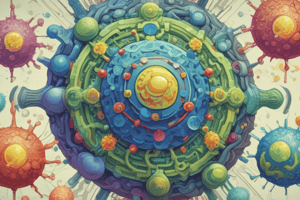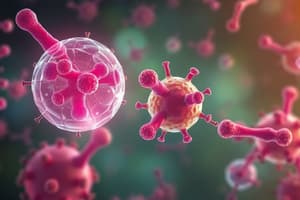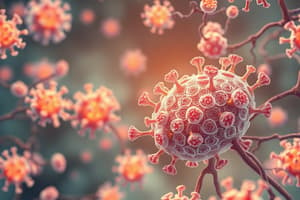Podcast
Questions and Answers
What is the function of Helper T cells in the immune response?
What is the function of Helper T cells in the immune response?
- Initiating lymphocyte migration
- Activating B cells and other T cells (correct)
- Maturing in bone marrow sites
- Secreting antibodies
Which cells possess MHC antigens for recognizing self?
Which cells possess MHC antigens for recognizing self?
- Plasma cells
- Red blood cells
- Macrophages
- Lymphocytes (correct)
Where do B cells and T cells mature?
Where do B cells and T cells mature?
- Bone marrow and spleen, respectively
- Thymus and bone marrow, respectively
- Bone marrow and thymus, respectively (correct)
- Spleen and bone marrow, respectively
What is the function of MHC glycoproteins coded by Class I MHC genes?
What is the function of MHC glycoproteins coded by Class I MHC genes?
How do plasma cells contribute to the immune response?
How do plasma cells contribute to the immune response?
Where do B cells primarily mature?
Where do B cells primarily mature?
What is the function of Class II MHC genes?
What is the function of Class II MHC genes?
What is the role of plasma cells in the immune response?
What is the role of plasma cells in the immune response?
Where do T cells primarily mature?
Where do T cells primarily mature?
Which cells possess MHC antigens for recognizing self?
Which cells possess MHC antigens for recognizing self?
Flashcards are hidden until you start studying
Study Notes
Immune Response
- Helper T cells play a crucial role in the immune response by activating B cells and cytotoxic T cells to fight against infections.
MHC Antigens
- All nucleated cells in the body possess MHC antigens for recognizing self, which helps to distinguish between the body's own cells and foreign substances.
Maturation of B cells and T cells
- B cells mature in the bone marrow, whereas T cells mature in the thymus.
Function of MHC Glycoproteins
- MHC glycoproteins coded by Class I MHC genes help to present intracellular peptides to cytotoxic T cells, allowing them to recognize and eliminate infected cells.
Role of Plasma Cells
- Plasma cells contribute to the immune response by producing large amounts of antibodies, which are proteins that recognize and bind to specific pathogens, helping to neutralize or remove them from the body.
Maturation of B cells
- B cells primarily mature in the bone marrow.
Function of Class II MHC Genes
- Class II MHC genes code for MHC glycoproteins that help to present extracellular peptides to Helper T cells, allowing them to activate the immune response.
Role of Plasma Cells
- Plasma cells play a crucial role in the immune response by producing antibodies that help to protect the body against future infections.
Maturation of T cells
- T cells primarily mature in the thymus.
Studying That Suits You
Use AI to generate personalized quizzes and flashcards to suit your learning preferences.




